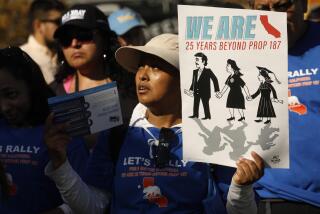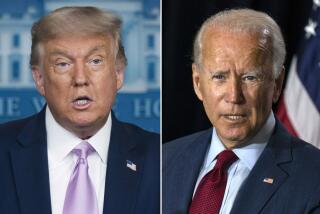Column: Biden shouldn’t let right-wing Cuban Americans drown out Cuban voices

President Biden should not let Cuban American elites — who are not representative of the Cuban people — dictate his policies toward the island.
Republican lawmakers such as Sen. Marco Rubio, Rep. Mario Diaz-Balart and others have criticized the Biden administration’s continuing review of Trump’s restrictions on remittances to Cuba.
Those leaders are well-fed, well-off and white, compared with the average Cuban. About 86% of Cuban Americans identify as white, but two-thirds of Cubans in Cuba are Afro or mixed — a consequence of the fact that the first Cuban émigrés to the U.S. were mostly affluent whites. Although this historically meant remittances benefited émigrés’ privileged relatives, more recent Afro Cuban immigrants in the U.S. have been helping relatives back home, too.
Biden says he favors letting Cuban Americans financially support relatives again but wants to make sure the Cuban military doesn’t take a cut. Remittances have long been a top source of income in Cuba, totaling $3.7 billion in 2019 and flowing largely through Western Union. Last fall, Western Union closed its 407 offices in Cuba because the Trump administration banned money from going to firms working with Cuban military-controlled companies. Western Union partners with Fincimex, a military-controlled agency, and a small fraction of remittance transaction fees ended up with the Cuban military.
The voices of comfortable Cuban Americans who oppose remittances because they loathe Cuba’s Communist leaders should not drown out the cries for food and medicine from Cubans. In last month’s historic protests, thousands chanted “patria y vida” — homeland and life — a hopeful reclamation of the Communist Party’s slogan, “patria o muerte,” meaning homeland or death.
Afro Cubans were front and center in the protests, and created the viral song, “Patria y Vida,” that inspired the chants. Biden should listen to them more than white Cuban elites in Florida and other parts of the U.S.
Biden was right to condemn the Cuban government’s repressive response, including hundreds of brutal arrests and an internet blackout. But his paralysis on reversing Trump’s cruel sanctions, a campaign promise, is concerning.
The U.S. embargo against Cuba, which dates back to 1962 and prohibits U.S. companies from doing business on the island, has failed to drive political change. We have 60 years of evidence that it has only worsened hunger and misery — and provided Cuba’s government with a perennial excuse for its failures. Trump’s decision to starve Cubans of remittances is more of the same.
“The U.S. has been tightening screws hoping that just one more turn of the screwdriver would somehow break the regime,” Manuel Pastor, a Cuban American professor of sociology at USC, told me. He says lifting sanctions would help the private sector and fuel a countervailing power to the Communist Party.
Many historians believe lifting sanctions, especially Trump’s remittance ban, would empower locals against the Cuban government. When Obama eased restrictions and boosted travel to Cuba, it exposed locals to a different way of life and politics. But, Pastor adds, this angers those Cuban Americans who have a “shared groupthink that you need to be tough on the Castro regime.”
Ada Ferrer, a Cuban American professor of history at New York University and author of the forthcoming “Cuba: An American History,” argues that Biden should expedite the remittance review. “The litmus test should not be that the Cuban government can get no money, because that’s just impossible,” she told me. “The Cuban government owns almost every store on the island.”
I spoke with Emily Mendrala, deputy assistant secretary for the State Department’s Bureau of Western Hemisphere Affairs, about the Biden administration’s remittance review. “There is a plan to work very quickly through the month of August and to have options ready to present in a matter of weeks,” she said.
I asked her if Biden’s hands would be tied by politics, since 58% of Cuban American registered voters lean Republican. (Republican-leaning Cubans are more likely to support harsh policies toward Cuba.) “I’m not going to prejudge the outcome of the working group, but President Biden’s overarching goals are clear,” Mendrala replied, citing Biden’s desire to let families support one another.
But many are losing patience with Biden’s pace given intense suffering in Cuba. Carlos Lazo, a Cuban American activist I spoke with, has been struggling to send money to his aunt. He accused Biden of “pandering to the most conservative sector of the Cuban American community.”
Rep. Barbara Lee (D-Oakland) and Rep. Jim McGovern (D-Mass.) are urging Biden to stop hesitating on remittances. “The most important priority at the moment is to respond to the suffering of the Cuban people,” Lee said in an emailed statement, adding that Biden “should quickly lift all restrictions and caps of family and donative remittances,” and a number of other sanctions.
McGovern said it’s hard to reconcile Biden today with the man who once promoted Obama’s loosened restrictions as a way to help the Cuban people. He added: “As of right now, I can’t tell the difference between Trump’s policies on Cuba and Biden’s policies on Cuba, and I hope that changes.”
Conservatives have seized on the Cuban government’s smashing of recent protests to argue for maintaining the six-decade-old status quo. Of course, that won’t bring democracy to the island or help protesters crying out for change. Biden needs to break from the decades-long U.S. cycle of backing right-wing interests on Latin America and Caribbean policy at the expense Afro and Indigenous people. Latino voters who helped elect him — including Cuban Americans outside of Florida — are waiting for him to do the right thing.
More to Read
A cure for the common opinion
Get thought-provoking perspectives with our weekly newsletter.
You may occasionally receive promotional content from the Los Angeles Times.












